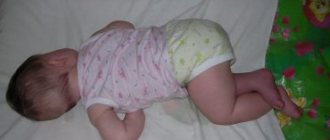How time has flown! You didn’t even notice how the baby grew up and became completely independent. The child pleases mom and dad with new records every day, knows a lot and can do a lot. The biggest relief for parents is when the baby regularly asks to go to the potty, even at night. It seems that the process of mastering the “toilet” science is a completed stage and you can finally relax. You hid the oilcloths a long time ago and don’t use diapers, so they still remain dry. It happens that even after a long period of successful toilet training, children again begin to regularly drown the bed at night. If this is permanent, the question becomes acute: how to stop a child from peeing in bed at night?
Age of dryness
Urinary incontinence is medically called enuresis. This is not a disease if your child is under 7 years old. Already at a year and a half, you can notice that the baby sleeps soundly all night, without wet accidents. Previously, little representatives of the fair sex stop writing. Boys stop wetting the bed every night around the age of one and a half to two years. These timings are very individual and mean that there will be more nights without a flood. But this does not guarantee that they will not exist at all. Rare cases of incontinence will occur more than once.
During the day, the baby already knows when to run to the potty. His brain sends signals to his bladder that it is full. Then comes the turn of the bladder sphincter - it needs to open and free itself from excess. A child who has been taught to consciously go to the potty manages to figure out what needs to be done in a few seconds between the first and second commands of the brain. However, at night everything is different. Although the brain never completely falls asleep, it dozes, so the SOS signal does not always arrive on time. By the time the little one realizes that he wants to pee, a puddle has already formed. It is not he who is to blame, but the immaturity of his nervous reaction.
How to deal with the problem?
Bedwetting in most cases has a neurotic basis. This is not a disease, but only a symptom. There is no need to blame the child, because he did not do it on purpose. You need to encourage and calm him down by choosing the right words. You cannot instill in him the idea that he is worse than his peers because he pees in the bed, as the problem will only increase. Putting diapers on your baby will have the same effect. This will not lead to relief from incontinence, but will only humiliate the baby.
An unfavorable home environment may prevent you from correcting the existing problem. Nighttime urinary incontinence in many children is associated with quarrels between parents and lack of attention on their part. It also happens that the baby begins to pee after a sister or brother is born. This is due to the feeling of alienation that he experiences when the parents' attention is concentrated on the second child. When faced with such a situation, it is important to give equal attention to both children.
When to start worrying
What to do if a child has reached the age of 7 years, even went to school, but continues to regularly write for himself? In this case, you need to try to establish the desired cause of this phenomenon. There may be several of them.
- Genetic feature. Perhaps someone in your family also peed at night for long periods of time. If this is the case, then we can talk about a family predisposition to enuresis.
- Experienced infectious processes of the urinary system. Even if any inflammation of the urinary tract in a child has gone unnoticed by you, it is possible that it will make itself felt for many years to come, manifested in cases of bedwetting.
- Stress and psychological shocks. It doesn't matter whether the stress was bad or good. Life changes such as moving, family events such as wedding or divorce, the birth of a parent's youngest child, going to school, relationships with others - all can cause nocturnal enuresis.
- Calcium-magnesium metabolism disorders. A deficiency of these elements can cause prolonged frequent incontinence.
- Exceeding permissible physical activity. Being active during the day is the key to good sleep. But if the baby gets too tired, his body simply won’t be able to wake up in time to go pee.
- Fears. Children are impressionable, so they are often afraid of the dark. Because of fear, the child cannot decide to go to the toilet and embarrassment occurs.
- Diabetes. With this disease, there is an increased urge to urinate, especially noticeable at night.
- Hypothermia of the body. If the apartment has a cold floor, and the baby runs around without slippers or plays on the floor, this provokes frequent urination, also at night.
Sometimes it is impossible to figure out on your own why a child pees at night.
When the problem becomes too noticeable, it’s time to go to the doctor for a consultation.
Where to begin?
Enuresis as a serious problem is considered by specialists only in children over seven years of age . Until this time, you can try to teach your child to go potty at night on your own.
Don't scold your baby
There is no need to scold your child for an incident at night, regardless of his age. He may feel guilty, and it will be much more difficult to get rid of it than childhood enuresis. The cause of bedwetting may well be stress, and reprimands can only aggravate it, and at the same time the problem with wet sheets.
Place a potty next to the crib
To prevent your child from associating night awakenings with unpleasant sensations, you should leave a plastic potty by his crib. A metal potty is not recommended: it can cause discomfort to the baby when it comes into contact with a cold surface. As a result, this can lead to attempts to avoid contact with the potty (See “How to choose a children's potty”).
Avoid overtiring your child
It is important not to let your child become overtired, because he may fall asleep too deeply and simply oversleep the moment when he needs to get up and go to the toilet. In addition, an excess of negative emotions and information can have a negative impact on the child’s psyche, so at night it is better to listen to calm music or read a favorite book.
Talk calmly to your child
A calm conversation with your child about wet sheets can help resolve the problem. If the problem haunts him often, you can give him pleasant bonuses as a reward for each “dry” night. This will encourage your baby to control urination. If you can’t train your baby to wake up to go potty, don’t despair. By the time the child’s nervous and genitourinary systems are fully formed, this problem usually resolves itself. But if enuresis bothers a child over seven years old, you should consult a specialist.
© Ilyina Natalia, dealinda.ru
Recommendations for dry nights
Having found out what exactly causes bedwetting in your child, you need to worry about how to wean him from wetting the bed. If it is not caused by a disease, the following tips will help:
- Start with a conversation. Try to find out from your child why he thinks he has frequent accidents. Maybe he is afraid to get up or is very sleepy and cannot wake up.
- Install a night light near your baby's crib. This will help you cope with fear.
- If the child is not too big yet, place a plastic potty near the bed so that he does not have to walk too far.
- Reconsider your attitude towards diapers. It may be best for you and your baby to sleep in a diaper at night. Of course, there is no need to go to extreme measures and put diapers on a child over 3 years old. This measure will only be needed until his nervous system is ready.
- Prepare clean sheets and clothes in the evening so you can immediately change your baby’s clothes and make the bed. It will not be very pleasant for the child to get up every time in the middle of the night and, in a sleepy state, wait for the linen to be changed. It's even better if you ask him to make his own bed. After a while he will prefer to remain dry.
- Do not give your baby salt-containing foods at night: salty, sour or spicy, as well as fatty and fried foods. In addition to the obvious harm to the body, these products cause a strong desire to drink water. At the same time, they overload the kidneys, delaying urination. Having failed to pee before bed, the child pees in the bed at night.
- In the same way, you should avoid diuretic drinks and excess liquids in general at night. Many children cannot fall asleep without drinking. This habit needs to be weaned. Give him a drink at least an hour before bed with a small amount of compote or milk and do not give him any more.
- The child must learn that before going to bed, it is imperative to empty the bladder. A routine habit will form, and the number of wet accidents will disappear.
- To prevent calcium and magnesium deficiency, you need to eat one of the following foods in the evening: banana, broccoli, fish, cottage cheese, apricots.
- Note for yourself the approximate time at which the child pees. Try to lift him up during this period so that he goes to the potty or toilet. At first this will tire both you and him, but then it will become necessary and will happen automatically.
- You can teach your child to control urination during the day. When he asks to pee, ask him to wait a little and only then allow him to go to the toilet. This is how connections are formed in the nervous system that guide control.
- Be sure to remind your baby before bed that he needs to pee not in bed, but in the toilet. Justify this with arguments suitable for your child: you are already an adult, you are doing well, it will be better and more pleasant for you to remain dry, etc.
- Be sure to praise your toddler for every accident-free night. He will want to hear it more often, and will no longer write.
- As simple as it may sound, love and care throughout the day, received in abundance from parents, helps wean off incontinence better than any other method.
Remember, the child is not to blame for his nightly failures. Nobody likes to be wet, and children are no exception. If he regularly pees in the bed, this does not mean that this position does not cause him discomfort. There are simply reasons that lead to incontinence.
Therefore, you should never scold a baby for peeing. Instead of weaning him off, you will only make the situation worse.
What to do if a child pees at night?
If urinary incontinence continues for a long time, it is important to determine the cause of this phenomenon. If problems with the kidneys and bladder are excluded, then the reason is probably in the child’s psyche. This problem is quite complex, but solvable. Psychiatrists note that most often, insecure, capricious boys involuntarily wet the bed.
Perhaps there are problems in relationships with parents who show little sensitivity to the baby and are too focused on teaching him to do the right things.
Treatment of enuresis
In situations where the baby is sick, the above recommendations may not help wean him from the habit of wetting the sheets. Sometimes serious treatment from a specialist is required to completely cope with the problem.
The doctor will examine the urinary system, kidneys, find out concomitant diseases, and ask about possible stress. Based on the results of tests and examination, adequate therapy will be prescribed. Sometimes it is enough to just massage the reflex zones. In other cases, medication cannot be avoided.
More than 50% of children over 3 years old have the problem of nocturnal enuresis. Most get rid of it by the age of 6-7 years.
But even if your 12-14 year old child peed himself, there is no need to be scared. You never know what could have caused this incident. In adults, only 0.2% of the problem remains, and then as a result of serious illnesses. So be patient and love. You will really need them in the difficult task of weaning yourself from puddles in your bed at night.
How to stop baby rocking in the crib?
The problem with a child’s habit of rocking in a crib is no less acute for parents than rocking in mother’s arms. As a rule, by the age of 1 year, children begin to sleep in their own bed, but often retain the habit of motion sickness. How to wean a child from motion sickness at 1 year old, what needs to be taken into account, and what methods to use?
Children aged 1-2 years find it more difficult to give up their habits and experience any changes more painfully. At this age, children develop a character pattern, and the baby becomes more stubborn in his desires and actions. It is difficult to cope with a child’s habit of falling asleep while rocking in a crib at 2 years old, but it is possible if you again have patience and act wisely.
What can help?
It is much easier to teach your baby to fall asleep in a crib without rocking if you wean him from rocking in your arms before this step. As life shows, parents come to such a decision closer to the child’s birthday. Try this:
- Place something of yours in the crib so that the baby can smell his mother. A scarf, a warm sweater, and a mother’s hat should be in the baby’s field of vision. If your son or daughter takes a pacifier, leave it in the crib.
- Sit near the crib and wait for the baby to fall asleep. Talk to him quietly, sing a lullaby.
- If the baby is worried, wrap him in a blanket and hold his hand. It is important for your baby to feel your closeness.
- It is easy to teach a child to sleep without motion sickness at the age of 1, if during the day you load him with useful information, games, and reading books, slightly increasing their intensity closer to bedtime. A tired baby will quickly fall asleep without motion sickness.
- Lay your baby down with his favorite soft toy. With her, he will not feel lonely and abandoned.
- Turn your baby's crib into a fun place for him. Fill it with toys and use fun baby bedding.
- Make bedtime a fun ritual. Choose a fascinating fairy tale to read before bed, place a night light-projector, an electronic mobile near the child’s crib, projecting the baby’s favorite characters onto the ceiling and walls. This way, you can teach a 1-year-old child to fall asleep without motion sickness.
- Taking a scented bath with soothing herbs will help you relax your baby before bed.
- At 2 years old, when the child has developed some fears, he can easily leave the bed; parents need to be persistent, but attentive. Put your baby to bed, turn on the night light, leave the room and listen. If the child is worried, crying, or cannot fall asleep within 5 minutes, return to the room, talk to him gently, and leave the room again.
When weaning your child from motion sickness, do not expect quick results. All children are different, some will agree with your decision in one week, while others cannot do without their mother’s presence even after three weeks. Stay with your baby until he falls asleep, but stop rocking him to sleep.










